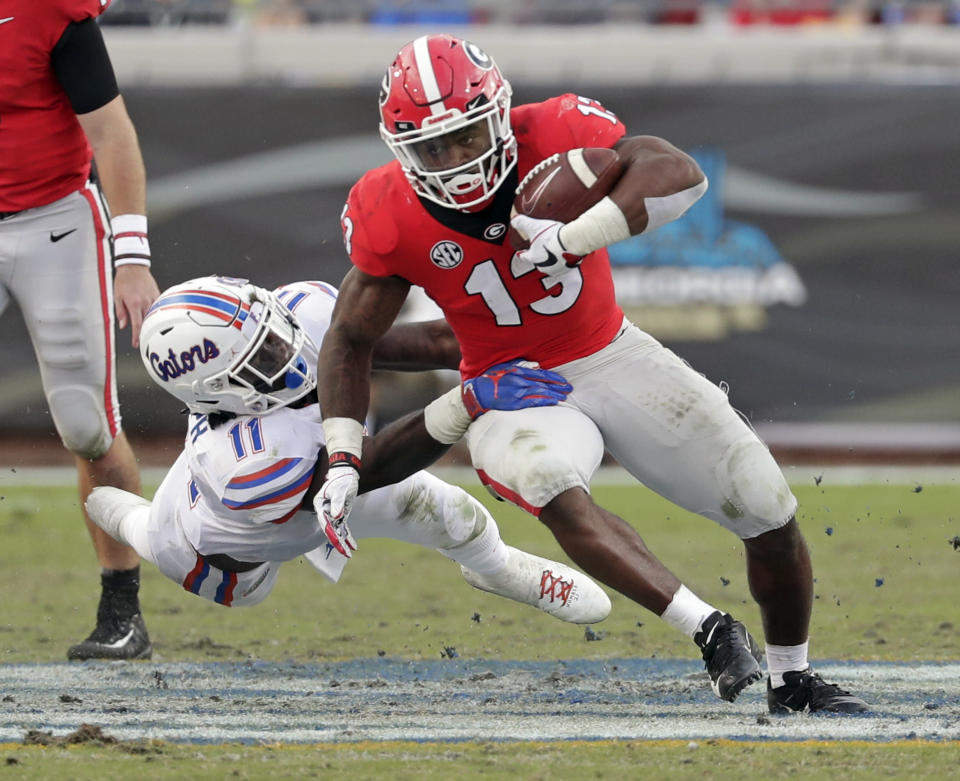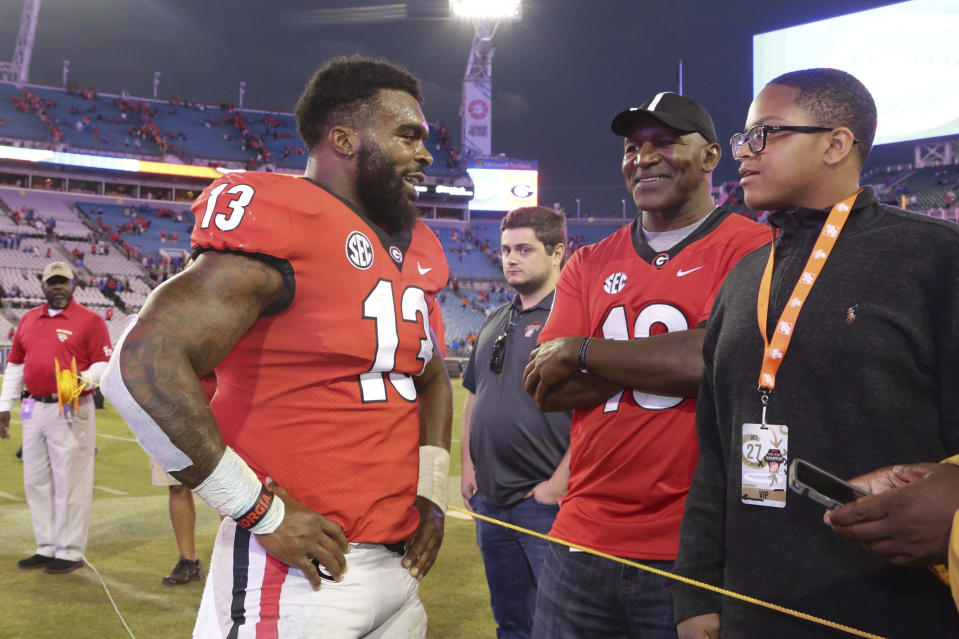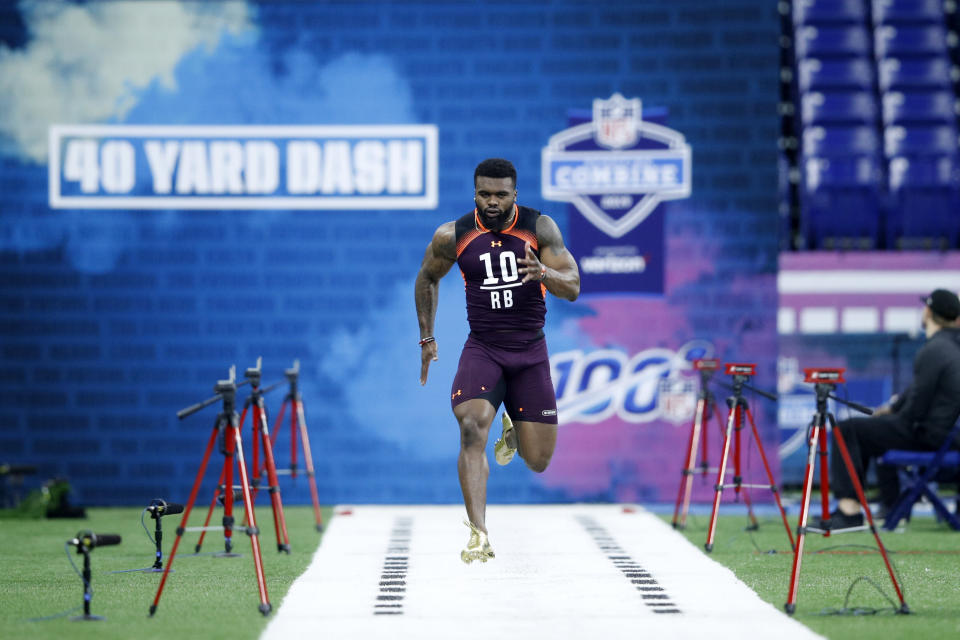More than a name, more than a number: Elijah Holyfield's draft saga
ATLANTA — Sing “Happy Birthday” out loud. Now, imagine your entire career depending on how quickly you get to the word “dear.”
Now take a look at your driver’s license. Imagine every person you meet judging you based on whether you measure up to the mountain that is your last name.
Put them both together, and you’re seeing the world of Elijah Holyfield, NFL draft hopeful, right this moment.
Holyfield is the son of boxing legend Evander, but that’s not the largest challenge facing him right now. NFL teams don’t worry much about surnames; they’d draft Dylan Thanos or Chase Voldemort if the prospects hit their numbers.
And that’s where Holyfield has hit rough water. He’s a running back out of Georgia, now known as a reliable factory for the position; both Super Bowl teams sported ex-Bulldogs in the backfield. But Holyfield surprised analysts when he declared for the draft after Georgia’s loss in an irrelevant Sugar Bowl last season … and then stunned them when he turned in some of the worst 40 times of the combine.
Holyfield ran a 4.78 on his first attempt at the combine, a 4.81 on his second. His pro day at Athens in March was even worse, with times of 4.86 and 4.89. He went from a a must-watch prospect — some early mocks even had him at a late first-rounder — to the far fringes, with some analysts suggesting he might not even get drafted.

A blink of an eye lasts one-tenth of a second. That means Holyfield’s career prospects are hanging in the balance by a couple of eyeblinks. And unlike his father, Elijah can’t just punch the problem until it drops. He just has to sit, and wait, and hope.
“I never thought I’d be considered a worse football player after not playing football,” Holyfield smiles during an interview with Yahoo Sports. “That’s been the biggest surprise to me.”
At Georgia, Holyfield spent his first two years deep on the depth chart; playing behind Sony Michel (now with New England) and Nick Chubb (now with Cleveland) has a way of crimping your playing time. When Holyfield got the chance to start, he rolled off 1,018 yards, averaging 6.4 yards per carry, and totaling seven touchdowns last season. He measures out at 5-10 and 217 pounds, and trying to tackle him is like trying to pull a fire hydrant out of the ground.
“He obviously looks the part. He's built like a Dick's Sporting Goods mannequin,” says UNC-Charlotte head coach Will Healy, who, as as a coach at Austin Peay, Georgia’s opening 2018 opponent, watched Holyfield score a touchdown on five carries. “He's got good pad level and catches the ball well out of the backfield. He's really good vertically. I think he's a short-yardage back who has the potential to grow into an every-down back.”
A hype video shows his bowling-ball-down-a-ski-slope style:
Impressive, sure, but pro level? Perhaps. After Georgia lost to Texas in the Sugar Bowl, Holyfield spent a long night thinking through his options, and ultimately decided to take his talents to Sundays.
ESPN’s Mel Kiper was one of the many second-guessing that decision: “I have always said, if you are not a first-round pick or an early to mid-second round pick, guaranteed, or the consensus of where you will be picked, you should go back for another year. If you have eligibility, use it,” Kiper said on a pre-draft conference call earlier this year. “Back in the day, it would be if you are not a first-round pick you did not come out early, now we have fifth, sixth, seventh round picks coming out early. It makes no sense to me.”
It’s a nice theory, but it doesn’t account for the reality at Georgia, which is simple: Holyfield wasn’t getting any more chances to get any better. The Bulldogs have rising junior D’Andre Swift ready to step into the RB1 role, and five-star freshman Zamir White could take the rest of Holyfield’s carries. Holyfield was looking at a situation where he very well might have been on mop-up duty, not exactly the way to burnish one’s draft stock.

Plus, Holyfield doesn’t have to look far for inspiration. Evander Holyfield spent much of his career underappreciated, fighting in the shadow of Mike Tyson. But Evander was one of the toughest boxers in history, fighting until he was 49 years old and suffering only two knockouts — one at age 41 to James Toney, and one to Riddick Bowe, who outweighed him by 50 pounds.
Like Elijah, Evander did his best work in close. Like Elijah, Evander controlled outcomes not by his speed, but by his toughness. And like Elijah, Evander knew that sometimes the battle was won long before the opening bell, just by outworking the other guy.
“Elijah brings a lot to a team,” Georgia head coach Kirby Smart said at the Bulldogs’ pro day. “He brings toughness, he brings a demeanor about him. He loves the work. He was the last guy off the field every day here. He wanted to catch extra balls. He’s done a tremendous job in our program and he’s going to do the same thing in [an NFL] organization.”
Only two of Evander’s 44 wins — both very early in his career — came in first-round knockouts. He wasn’t an explosive Tyson type; he would simply pound away at you, like punching through a wall, until you cracked. And that same philosophy is what’s guiding Elijah after the frustration of the 40 times.
“Everyone knows I can run well, but I’ve never been a good tester,” Holyfield says. “I felt good about [the 40], I had trained hard, but I didn’t run my best. I don’t know whether I got too pumped up or what. I had been running 4.5, 4.6. If I ran 4.7, 4.8 in practice, I never would have run it.”
That 40 does strange things to people. As Holyfield notes, it bears little resemblance to football — “There’s not a lot of energy. You’re not hyped up. It’s very quiet, just you, the track, and the coaches in an empty stadium.”
Holyfield lives with his mother, Tamie Pettaway, who keeps a close watch on both her son’s progress and the media surrounding him. She’s got a mother’s bias, sure, but she’s not alone in thinking there’s more to Elijah’s future than one bad number.
"Let's put it this way: How many times does a running back sprint 40 yards in a straight line unimpeded?” says Yahoo Sports NFL draft analyst Eric Edholm. “Maybe it prevents him from playing kickoff coverage? He's got a hurdle to overcome -- speed is important -- but this is not an end-all-be-all metric for the position in my opinion.”
Edholm concedes that there aren’t many running backs with such numbers, but points out that Alvin Kamara and Kareem Hunt — two backs who have enjoyed recent success — weren’t Flash-level speedsters either.
“You also have to have a lot of respect for him,” Healy says. “Being who he is, the son of who he is. He waited his time at UGA and battled his butt off every day. That doesn't happen a lot in college football anymore, especially with a name like he has. Most of those guys run for the hills and go somewhere where they offer a lot of carries. He's been very loyal.”
“Holyfield is a frenetic back with a palpable energy that works in his favor but also causes diminished patience and impulsive run tracks at times,” reads the scouting report of NFL.com's Lance Zierlein, who notes that despite Holyfield’s ugly combine, “his play traits could make him a solid backup.”
And that’s where the good news for Holyfield comes in. “Backup running back” for a football team is like “backup pint glass” for a bar; it’s not a question of whether you’ll need one, it’s merely how soon. Literally every team in the NFL is always on the hunt for a backup running back, and all it takes to turn Elijah Holyfield from combine cautionary tale to NFL player is one team.
“The more you watch me play, the more you realize I have enough speed to get by,” Holyfield says. “I may not be the fastest guy in the room, but I’ve never been considered slow. At running back, you just have to be faster than the guy running after you. I’ve outrun plenty of guys with quote-unquote ‘better 40 times.’ ”
As his father — and his father’s opponents — could tell Elijah, a lot can happen when you get one clear shot.
Pete Thamel contributed research assistance to this article.

____
Jay Busbee is a writer for Yahoo Sports. Contact him at jay.busbee@yahoo.com or find him on Twitter or on Facebook.
More from Yahoo Sports:

